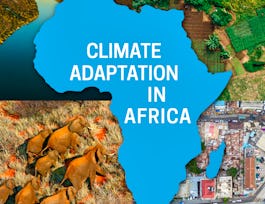At first glance the fields of religion and ecology may seem and unlikely pairing, but a deeper consideration reveals the two have a great deal to contribute to one another and are indeed inextricably linked. Religions recognize the unity and interdependence of humans with nature. Ecological sciences affirm this deep interconnection with the natural world. This partnership can inspire work for the wellbeing of the Earth community



Indigenous Religions & Ecology


Instructors: Mary Evelyn Tucker
Sponsored by Mojatu Foundation
4,449 already enrolled
(46 reviews)
Recommended experience
Details to know

Add to your LinkedIn profile
8 assignments
See how employees at top companies are mastering in-demand skills


Earn a career certificate
Add this credential to your LinkedIn profile, resume, or CV
Share it on social media and in your performance review

There are 10 modules in this course
What's included
4 videos7 readings1 discussion prompt1 plugin
We explore terms and themes in the study of Indigenous religions and ecology. Terms such as Indigeneity, sovereignty, lifeway, cosmovision and cosmopolitics are examined. Underlying themes such as responsibilities, rights and reciprocities with the Earth are highlighted by Native spokespersons. There is an inherent call for interweaving environmental and social justice often referred to as integral ecology.
What's included
3 videos10 readings1 assignment1 discussion prompt3 plugins
Settlers and nation-states have used stereotypes to demean, subjugate, and exploit Indigenous peoples, communities, and lands. “Decolonization” is the recognition of this historical distortion and the racism that continues into the present. In light of this reality, “Indigeneity” may be seen as a call to self-discovery necessary for restoring Indigenous voices and sovereignty in decision-making.
What's included
7 videos6 readings1 assignment1 discussion prompt2 plugins
Native worldviews and cultural values were undermined by dominant societies. Yet these losses did not fully erase the resilience that has led to recovery of lifeways and traditional knowledge, as described by a Hopi elder. Native peoples in North America have restored relationships with land and seeds, lakes and rivers, animals and biodiversity. This is expressed in ritual revivals among the Crow and Salish peoples as well as ecosystem restoration by Pacific Northwest peoples. We see resilience among Arctic Inuit peoples struggling with climate emergencies, and Gwich’in peoples resisting oil development in caribou calving grounds.
What's included
3 videos15 readings1 assignment1 discussion prompt6 plugins
We examine Indigenous peoples from Meso-America through the Amazon Basin and South America. In diverse ways their cosmovisions draw on traditional values and practices providing resilience in the face of present challenges. As Indigenous peoples reintegrate their social and spiritual visions they mount creative modes of resistance to exploitation. These contemporary expressions of environmental activism directly relate to their struggles to establish the rights of nature as expressed in the Universal Declaration of the Rights of Mother Earth.
What's included
2 videos16 readings1 assignment1 discussion prompt9 plugins
We open with Wangari Maathai, the Nobel Prize winning environmentalist and founder of the Greenbelt Movement for reforestation led by women. Then we explore local Native groups in Africa touching on their environmental challenges after centuries of colonization. Forest conservation and climate challenges provide themes for exploring ways in which traditional African societies bring religious worldviews and ethics to bear on these issues.
What's included
4 videos17 readings1 assignment1 discussion prompt5 plugins
We examine regions in Asia where Indigenous peoples continue to experience global and national challenges to their cultural integrity. These include projects such as dams, deforestation, and industrial extraction in which environmental resistance provides rallying points for Indigenous cultural survival. We explore the practices of these Indigenous peoples as they ritually interact with land and biodiversity, which also includes the revival of diverse forms of shamanism.
What's included
4 videos19 readings1 assignment1 discussion prompt7 plugins
We examine diverse groups of Indigenous-Aboriginal peoples who for over 50,000 years have inhabited the land mass now called Australia. Cosmovisions, law, and cultural practices find expressions in Dreaming and Songlines, as well as social and eco-justice movements. We hear elders narrate how mythic stories ground fire regimes that keep forested areas cleared. We see how restoration projects bring traditional knowledge forward for renewal of peoples and ecosystems. Many of these ancient custodial relations are now beginning to inform mainstream societies’ ecological practices.
What's included
1 video19 readings1 assignment1 discussion prompt11 plugins
The relations of Indigenous peoples to oceans, islands, rivers, and biodiversity are the focus of this module on the Pacific region. Interactive themes such as cosmovisions, transoceanic voyages, food sovereignty, and climate emergencies frame these discussions. Ancient Māori and Hawaiian aspirations toward ecological wellbeing surfaces in the renewal of Indigenous knowledge and cultural practices leading to responsibility for our planet. This also finds expression in the quest for rights of nature.
What's included
1 video20 readings1 assignment1 discussion prompt14 plugins
What's included
1 video1 reading
Instructors


Offered by
Why people choose Coursera for their career




Learner reviews
46 reviews
- 5 stars
80.43%
- 4 stars
13.04%
- 3 stars
4.34%
- 2 stars
0%
- 1 star
2.17%
Showing 3 of 46
Reviewed on Jan 18, 2024
Honestly one of the best courses I have ever taken!
Reviewed on Jul 5, 2022
Some of the video links did not work but I was able to google the videos
Reviewed on Mar 2, 2023
I found this very engaging and stimulating to be put through a global indigenous connection with ecology.
Recommended if you're interested in Arts and Humanities

University of Colorado Boulder

University of Cape Town

Duke University

Erasmus University Rotterdam

Open new doors with Coursera Plus
Unlimited access to 10,000+ world-class courses, hands-on projects, and job-ready certificate programs - all included in your subscription
Advance your career with an online degree
Earn a degree from world-class universities - 100% online
Join over 3,400 global companies that choose Coursera for Business
Upskill your employees to excel in the digital economy


